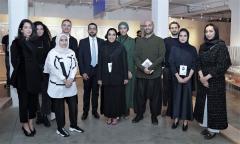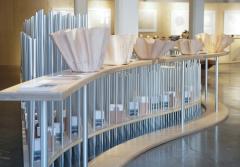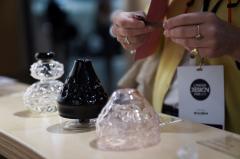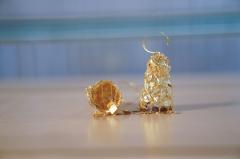Irthi Headlines With 78 Exclusive Luxury Products At London Design Fair 2019

Irthi Contemporary Crafts Council (Irthi), an affiliate of NAMA Women Advancement Establishment, unveiled 78 exclusive luxury products as part of 12 collections in jewellery, furniture, home décor, perfume bottles, incense burners and more, on Thursday, during the opening ceremony of London Design Fair 2019.
Irthi is representing the United Arab Emirates as the fair’s ‘Official Guest Country Pavilion’ from September 19 – 22.
The Council’s first product line that was launched at its highest-profile international platform to date, is the result of its two pioneering projects: Design Labs and Crafts Dialogue, both of which are founded on the creative potential of collaboration and are thoroughly international in outlook.
The collections feature luxury products that were handcrafted by artisans and trainees from Irthi’s Bidwa Social Development Programnme, in collaboration with designers, artists and makers from the UAE, Pakistan, Japan, the US, the UK, Spain, Italy and Palestine.
Ranging from sculptural totem-like chair stacks to landscape-inspired hand-blown Palestinian glass, the works on display include four collections from the Crafts Dialogue project, and eight from Design Labs. Each collection includes three to 10 items, all made by hand by more than 40 experienced women artisans and trainees, employed by Irthi’s Bidwa Social Development Programme.
His Excellency Sheikh Fahim Bin Sultan Al Qasimi, Executive Chairman of the Department of Government Relations, Sharjah, Sheikha Hind bint Majid Al Qassimi, Chairperson, Sharjah Business Women Council, HE Reem BinKaram, Director, NAMA, HE Rawdha Alotaiba, Deputy Head of Mission at the UAE Embassy, London and Raghda Taryam, Board Member of Sharjah Chamber of Commerce and Industry, were part of the fair’s official opening ceremony
During the fair’s opening press tour, HE Sheikh Fahim said: “Irthi’s participation as guest country pavilion at LDF is a reflection of Sharjah’s investment in social entrepreneurship, under the directives of His Highness Sheikh Dr Sultan bin Muhammad Al Qasimi, Supreme Council Member and Ruler of Sharjah, and his wife, Her Highness Sheikha Jawaher bint Mohammed Al Qasimi, Chaiperson of NAMA.”
He added: “Considered the cultural capital of the region, Sharjah boasts a thriving creative industry and a diverse population, as does London. It is clear that these common values cement the long-standing relationship between Sharjah and London.”
Reem BinKaram, said: “Irthi’s participation at LDF, and the launch of its first exclusive product line, handmade by Emirati women artisans and trainees with international designers and makers, is a testament to Sharjah’s reputation as an international hub for creatives, and a great place for women in crafts to access new international markets such as this one, and achieve social and professional empowerment.”
“These successes are made possible by the directives and patronage of Her Highness Sheikha Jawaher bint Mohammed Al Qasimi, wife of HH the Ruler of Sharjah, Chairperson of NAMA,” BinKaram added.
Crafts Dialogue
Founded on a firm belief in the creative potential of collaboration, Crafts Dialogue provides an opportunity for international and local designers to form working relationships and create products that fuse Emirati and European material resources and approaches to craft. The four Crafts Dialogue collections are the result of a collaboration between Irthi and Barcelona-based creative agency, Creative Dialogue. All products featured are available as limited editions.
Emirati Clay x Italian Murano Class
Designers: Fatima Al Zaabi (UAE) and Matteo Silverio (Italy)
Products: Vase, Lamp and phone charger
Al Zaabi and Silverio’s product collection is the result of an experimental exploration into how Murano glass, an inherently fragile material, and Emirati clay – by nature, sturdy and hardwearing – might be combined to form a single object. As well as its innovative material combination, the collection also seeks to enrich craft practice by merging handmade and computerised techniques – tradition and innovation working in harmony. Parametric design and digital fabrication tools were used to create moulds while artisans used their hands to manipulate the form of the glass and clay within them.
Safeefah
Designers: Ghaya Bin Mesmar (UAE) and Mermelada Estudio (Spain)
Products: Chairs
A single image of a desert house inspired Ghaya Bin Mesmar and Mermelada Estudio’s design for this collection of chairs. The traditional areesh house – made from palm fronds – had been blown down by the wind, making it look like a majestic cone. Taking this conical form, the chair allows for both privacy and protection from the elements. It combines traditional Safeefah (palm-frond) weaving techniques and a vibrant colour range.
Emirati Clay x Safeefah
Designers: Abdallah Al Mulla (UAE) and Pepa Reverter (Spain)
Products: Stools and tables
Pepa Reverter and Abdallah Al Mulla’s clay stools and tables have been designed to create totem-like sculptural forms when stacked. A decorative belt wraps around the clay stools and tables, incorporating the Emirati Safeefah palm-frond weave. The furniture, however, goes beyond visual novelty. The sheer scale of the objects – more than 60 cm in diameter and 100 cm high – pushes clay design to its limit.
Spanish leather x Emirati Talli
Designers: Adrian Salvador Candela (Spain) and Shaikha Bin Dhaher (UAE)
Products: Fruit bowls
Embracing the natural, mouldable qualities of leather and the subtle expressiveness of Talli weaving (traditional hand-woven braids), these sculptural, curvilinear bowls are reminiscent of both desert dunes and the drapery of women’s veils, while the colours and textures which form naturally when exposed to water and sunlight, evoke images of weathered hands weaving leather threads.
Design Labs
Like artist residencies, Irthi’s Design Labs programme pairs trainee artisans enrolled in the Bidwa Social Development Programme with regional and international designers. These collaborations provide an opportunity for the exchange of knowledge, disciplinary approaches and production techniques, and consequently the creation of innovative new products.
Products created through the Design Labs programme include:
Tapestries by Irthi and Kazuhito Takadoi (Japan)
Safeefah x Japanese grass
These Japanese washi paper tapestries are the fusion of two traditional crafts: Emirati Safeefah and Japanese grass weaving. These tapestries were made in collaboration with Kazuhito Takadoi, a UK-based Japanese artist who specialises in weaving and embroidering natural materials. Takadoi’s work has been acquired by the V&A Museum and he was shortlisted for the 2019 LOEWE Crafts Prize.
Bags by Irthi and Jennifer Zurick (USA)
Safeefah x camel leather
This collection of sculptural handbags created using traditional Safeefah weaving techniques to braid strands of camel leather is the result of a collaboration with Jennifer Zurick. A self-taught artist based in Kentucky, Zurick specialises in black willow bark which she has been harvesting and weaving into baskets since 1980. Her work has been acquired by the Smithsonian Museum and she has been commissioned by luxury fashion house LOEWE.
Vessels by Irthi and Dima Srouji (Palestine)
Oud x Palestinian glassblowing
Palestinian architect and designer Dima Srouji and glassblowers from Palestine
worked with Bidwa trainees, to train them on the basics of the craft, to develop contemporary non-traditional glass perfume and oud oil bottles, alongside Midkhans (incense burners). The glass forms were inspired by the natural Palestinian and Emirati landscapes and by textures such as cactus, coral stone and jellyfish. Glassblowing is one of the oldest and most technically complex crafts in Palestine, where glassware is traditionally produced from sand and sodium carbonate from the Dead Sea.
Misbah jewellery by Irthi and The Lél Collection (Pakistan)
Talli x Misbah
To create these collections, Bidwa trainees collaborated with Pakistan-based Lél whose workforce consists of displaced Afghani artisans. The two misbah collections present prayer beads as both pieces of jewellery and sculptural designs for the home. For the jewellery collection, Bidwa trainees employed traditional Talli weaving techniques to create interlacing of gold and silver threads finished with beads of lapis lazuli.
Intended for the floor, to be hung on walls or simply displayed on a dining table, the second collection of decorative misbahs for the home were designed by Lél’s stone artisans and Bidwa trainees using Emirati door motifs as inlays, while the Bidwa artisans combined Talli methods with macramé to create 3–8m Misbahs of engraved and inlaid stone, resin and wood.
Midkhans by Irthi and Adi Toch (UK)
Oud x metalwork
Used to burn incense at home, Midkhans are among the most common objects found in Emirati households. Working with the V&A and LOEWE-shortlisted artist Adi Toch, Irthi’s Bidwa trainees mastered metalsmithing, hammering, and using organic materials to dye metal to create a new modern family of unique Midkhan designs.
Furniture by Irthi x Architecture and Other Things (UAE)
Safeefah x Sand Casting
Irthi’s Bidwa trainees collaborated with designers Nada Taryam, Faisal Tabbarah and Khawla Al Hashimi, experimenting with different combinations of water, sand, concrete, clay and soil to produce a rock-like material that was cast into special frames filled with sand. This was used to produce a unique collection of sand casted furniture – a table and a set of tools.
Jewellery by Irthi x Alia bin Omair (UAE)
Safeefah x Gold Casting
The nimble fingers of Bidwa’s artisans gave wings to UAE-based jewellery designer Alia bin Omar’s designs using Safeefah techniques to weave wearable items such as necklaces, rings, earrings and wearable perfume bottles. A wax mould was created of the palm fronds woven by the artisans based on Omair’s design and cast in 18 karat gold to create this stunning collection.
Embroidered camel leather screens by Irthi x Bint Thani Collection (UAE)
Embroidery x Camel Leather
Irthi collaborated with Emirati designer Khuloud Al Thani’s atelier to create designs based on folktales that are a part of the Emirati consciousness, embroidered and stitched on camel leather by the Bidwa artisans. Traditional Talli braids were integrated into the designs to bring the characters in the stories to life, using haute couture fashion techniques for interior design applications. This collection is also an attempt to keep an intangible Emirati culture alive.
A Historical Journey of Emirati Crafts at LDF 2019
Inspired by the forms and materials of the UAE’s natural landscape, Irthi’s Guest Country pavilion was designed using elements from the natural landscape of the UAE; wood and camel leather, creating a distinctly organic display environment that provided a one-of-a-kind experience to visitors.
The exhibition design took London Design Fair visitors on a journey from raw material used in the making of Emirati crafts, to the preparatory process, design and making, incorporating details of the rich handmaking heritage of Sharjah and the United Arab Emirates on the way.
Social Development through the Crafts
Irthi’s Bidwa Social Development Programme aims to provide Emirati women the vocational training and market access they need to generate a sustainable income and achieve professional and social empowerment, through commercial collaborations and regional artisan exchange programmes.
Over 60 artisans are enrolled in the Bidwa programme, who practise traditional handicrafts such as Talli (hand-braiding), Safeefah (palm-frond weaving) and embroidery. As part of the Design Labs, new trainees joined the Bidwa programme, undergoing short craft courses and soft skills training to build their artisanal capabilities and social skills.




